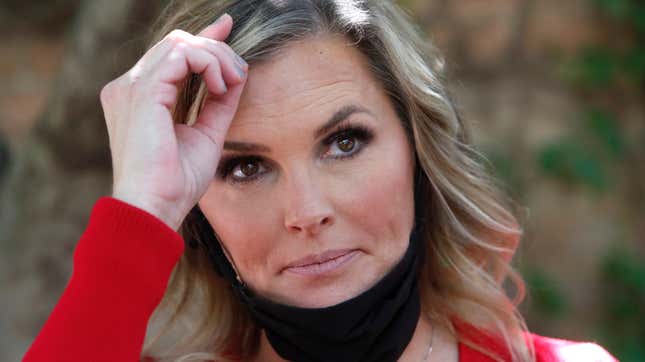How the Hair Salon Became a Battlecry For Freedom
Latest

At the end of April, Shelley Luther, the owner of a hair salon in Dallas, headlined an “Open Texas” rally in the town of Frisco, speaking to a crowd of about 250 who had gathered in front of the city hall. The crowd was raucous—some carried Trump campaign flags while others waved yellow “Don’t Tread On Me” flags, standard paraphernalia at these morbid protests demanding an end to stay-at-home orders around the country. Few, of course, were wearing masks; people felt free to stand close to others and cheer; almost all who gathered were white.
Luther was there to speak about what she viewed as a violation of her rights: in defiance of both the state Governor Greg Abbott’s order closing non-essential businesses and a Dallas County directive she had reopened her beauty parlor, Salon À La Mode, that week. A Dallas County judge, Clay Jenkins, had sent her an order to once again close her salon, a directive that Luther had ignored. On the day of the “Open Texas” protest, Luther strode onto the stage, her highlighted blonde hair partially pulled back and a black blazer over her hot pink t-shirt.
“I just want to say I’m not anyone special. I just know that I have rights, you have rights to feed your children and make income, and anyone that wants to take away those rights is wrong,” she said to cheers. (Apparently, these rights extended to taking a cruise, which she did in March, even as the pandemic was raging.) Luther referenced her father, who had been in the Marines. “He did not leave our family when we were little and barely see us growing up for this crap to happen,” she said forcefully. We need to “take our country back,” Luther said.
We need to “take our country back,” Luther said: from whom, she didn’t specify
“Tear it up!” someone called from the crowd, and Luther did just that, before flinging the bits of paper into the audience, to huge cheers. “Come and get it, Judge Clay Jenkins,” Luther shouted into the microphone, making a play on the state’s unofficial motto, “come and take it.” It would have been more appropriate for Governor Abbott to be the target of her ire—it was Abbott, after all, who had issued the state’s order to temporarily close businesses like her salon. But her logic was clear: Jenkins was the official who had called on her to close up shop, it was an easier narrative to shift the blame onto a Democrat than to question the state’s Republican governor. “Come and get it. I will not shut my salon,” she added.
What happened next made Luther a conservative martyr and hero—the following Tuesday, the city of Dallas filed for and received a restraining order against Luther when she ignored yet another cease-and-desist letter. After she continued to keep her salon open, arguing that “what they’re doing is totally unconstitutional,” she was arrested and was sentenced to seven days in jail, along with a $7,000 fine. By then, Luther’s story had spread throughout the rightwing ecosystem, with regular mentions on Fox News, a visit from Sarah Palin to the salon, and donations flooding in from around the country to a fundraiser that had, curiously enough, been set up for Luther days before she spoke at the Frisco protest, one that ultimately raised more than $500,000. While Luther consistently argued that she needed to reopen because her stylists were going hungry, and she needed to pay not only her employees but her bills, in reality, she was in a very different financial situation—in addition to the money raised through her online fundraiser, Luther had received a loan through the Paycheck Protection Program, which should have allowed her to continue to pay her employees, even with her salon closed.
-

-

-

-

-

-

-

-

-

-

-

-

-

-

-

-

-

-

-

-

-

-

-

-

-

-

-

-

-

-

-

-

-

-

-

-

-

-

-

-








































